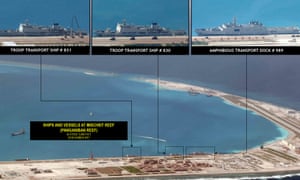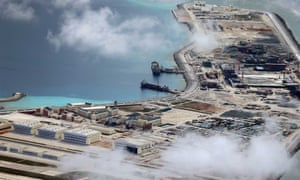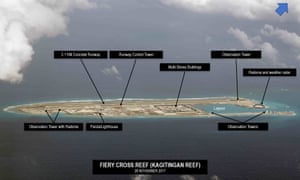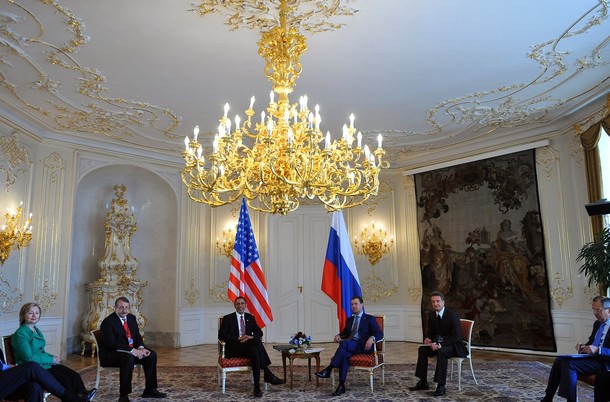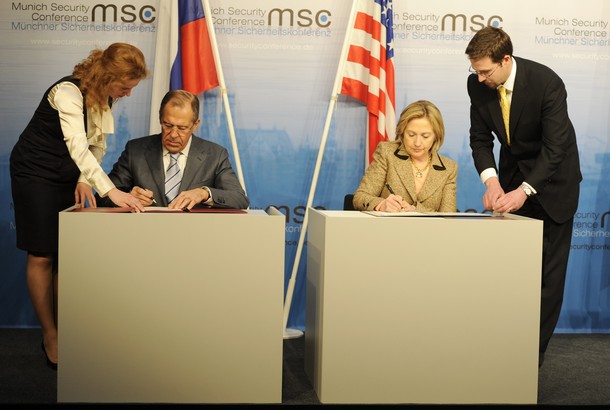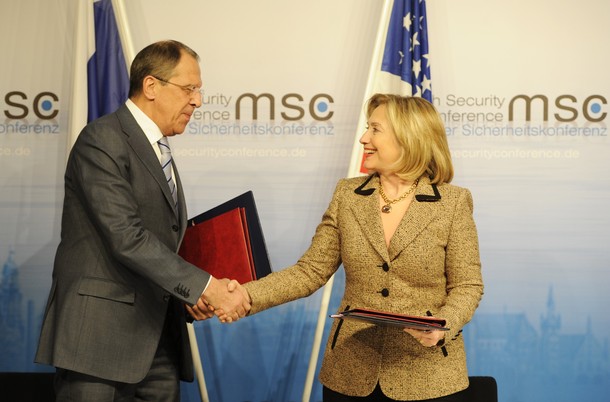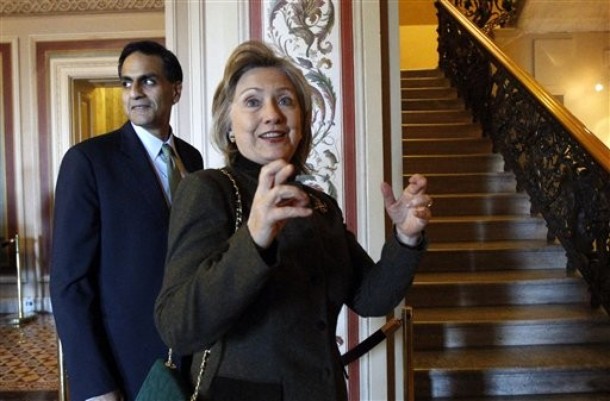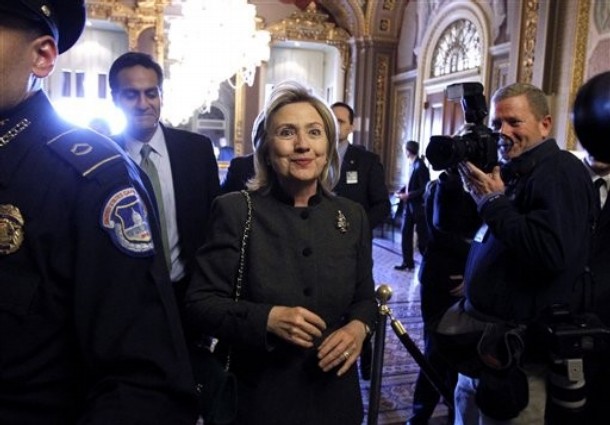QUESTION: Secretary Clinton, thank you very much for sitting down
with the BBC. And the response to our call for questions has been
overwhelming. The thousands of viewers we have across the
Persian-speaking world have sent in their questions. And in a matter of a
few days, back when we were initially scheduled to speak with you in
the spring, and, of course, in the last 24 hours, got over 1,500
comments on the website, and then over 1,000 emails, many of them in the
form of text messages, cell phone calls from Iran, voice messages and
videos. And colleagues have selected a number of them as representing
the themes that we have received. If you don’t mind, we’ll just go right
to them.
SECRETARY CLINTON: Sure. This is very exciting, Bahman. Thank you.
QUESTION: Yes. This is the first question from a viewer that
had to cover his face, blur his face, because of security concerns. His
name is Amir and he lives in Tehran:
(Video clip played.) (Via interpreter) Hello. First, let me apologize
for covering my face, as I had to. My question is about the sanctions
and the fact they have increased in the past two years. Many airplanes
have crashed, prices have gone up, and many jobs have been lost due to
these sanctions. Considering your claims about friendship with the
people of Iran, how do you justify this severe about of pressure on
Iranian people? (End of video clip.)
QUESTION: We have recordings that show that we’ve got a lot of
questions on the sanctions, more than any other subject really. And the
simple fact is, acknowledge pressures are increasing, and a lot of
people inside are wondering how any of these sanctions are changing the
behavior of the government, and that all is complicating a population
that sees itself more and more squeezed between its rulers and then
sanctions that are met by United States. How do you tell them that
America is their friend?
SECRETARY CLINTON: Well, first, I want to thank Amir for
having this question, because I know it represents the feelings and
concerns of many Iranians. And I want to begin by reaffirming our very
strong support for and friendship toward the people of Iran. We would
very much like a different relationship with the rulers, and certainly
President Obama came into office seeking that. And unfortunately, that
has not come to pass.
And at the same time, we see disturbing trends and actions having to
do with the continuing covert effort to build a nuclear weapons program,
not a program for peaceful, civil, nuclear power, which Iran is
entitled to, but a nuclear weapons program with a lot of deception, a
lot of lying to the International Atomic Energy Agency and the rest of
the international community. We see aggressive behavior towards
neighbors in the region. We see efforts to try to hijack and undermine
the so-called Arab Spring Awakening. And we do not want a conflict with
Iran, but we do want to see the rulers of Iran change their outlook and
their behavior.
So we have always pursued a two-track policy. We are prepared to
engage, if there is willingness on the other side, and we use sanctions –
and the international community supports the use of sanctions – to try
to create enough pressure on the regime that they do have to think
differently about what they are doing. I am aware that, from time to
time, certain sanctions can be difficult for totally innocent people
going about their daily lives.
But I would ask you to put yourself in the position of the
international community and those who seek a better future inside Iran.
If you do not want to have a conflict, if you do not want to just give
way to behavior that is very reckless, as we saw in this recent plot
against the Saudi ambassador, potentially dangerous, sanctions is the
tool that we have at our disposal to use. The whole goal is to change
behavior, and anything that can be done from within Iran to send a
message to the regime that this is important to change behavior because
of the concerns that the people have and because of the better potential
for a better relationship with the rest of the world, we would welcome.
QUESTION: We will get to the plot in a minute. But the
question on sanctions is so much more about whether they’re effective,
though. You look at 30 years of Iran’s relations post-revolution, and
there has been sanctions. It hasn’t changed to – in fact it’s made it
worse. If you look at Iraq and all that sanctions didn’t change Saddam’s
behavior at the end. The question for the people looking at this is,
sure, maybe that’s the only thing you have at your disposal, but it
doesn’t seem to work at all.
SECRETARY CLINTON: Well, I think it has put a lot of pressure
on the regime, which is the first step toward, perhaps, getting some
within the regime to look at each other and say, “Hey, come on. Why are
we doing this to ourselves and to our people? Our economy is – wasn’t
terrific to begin with, and now it is under greater stress. Why do we
want to continue down a path that we know is not going to bring the kind
of support for our own development, our own economic future?”
Now, when you have a group of people or individuals in control who
seem not to care about their own people, who seem to reject human
rights, who seem to reject the dangers that nuclear weapons would pose
in destabilizing the region, you’re right. It’s hard. But I cannot
believe, Bahman, as we sit here today, that there aren’t tens of
thousands of educated, smart, influential Iranians who can’t begin to
say, “Hey, we got to make some changes here. We need to take a look at
how we are governing ourselves.” And that’s what I hope will happen.
QUESTION: Get to a human rights question that is sent from
Tehran, and this one is from Sharon -- actually he lives – he’s a
refugee. He went to Turkey, post the events in 2009:
(Video clip played.) (Via interpreter) I’ve got two questions for
Mrs. Clinton. Considering that Iran regime has been unmanageable and
un-reformable in the past 33 years and has been recognized in the
international community as a state sponsor of terror, why has the U.S.
policies towards Iran has been compromising and peaceful? Why has the
U.S. not supported Green Movement in Iran? (End of video clip.)
QUESTION: On that, we’ve got lots of questions about the Green Movement and where U.S. stands.
SECRETARY CLINTON: Yes.
QUESTION: Some – many of our audience have said you were too
slow at the beginning to support. Some others have actually come out and
said you shouldn’t have supported it at all, because it will give
government that excuse to pressure it. If you could go back to 2009, how
would you do it differently? What would you say to Sharon?
SECRETARY CLINTON: Well, I would say to him that at the time
the most insistent voices we heard from within the Green Movement and
the supporters from outside of Iran were that we, the United States, had
to be very careful not to look like what was happening inside Iran was
directed by or in some way influenced by the United States, when in fact
it was an organic uprising by people who knew their election had been
stolen, who saw the hypocrisy and the betrayal in the regime for what
had been promised. So we were torn.
I will tell you it was a very tough time for us, because we wanted to
be full-hearted in favor of what was going on inside Iran, and we kept
being cautioned that we would put people’s lives in danger, we would
discredit the movement, we would undermine their aspirations. I think if
something were to happen again, it would be smart for the Green
Movement or some other movement inside Iran to say, “We want the voices
of the world. We want the support of the world behind us.”
That’s what the Libyan opposition figures did, as you remember. When
they began their struggle against Qadhafi, and it seemed like such a
hopeless uphill climb, they, from the very beginning said, “We want all
the support we can get from the outside world. We want our Arab
brothers, we want the region, and we want the United Nations, and we
want everybody to help us.” And I think that maybe in retrospect it was
an unfortunate mutual decision on the part of the leaders of the Green
Movement and the supporters inside Iran and those of us on the outside,
who very much hoped that that would spark reform.
We are not interested in seeing violence and seeing innocent people
killed, tortured, detained, mistreated. But we do hope there can be a
reform movement that has enough power, like we saw in Egypt or in
Tunisia, where they had a peaceful revolution, by and large. So there
are different models, but what happened in 2009 was unfortunate, because
there was such momentum, and the demands were totally fair and
credible. We did things from the outside like tell Twitter to keep
operating so people could keep communicating. We tried to be helpful,
but we were very careful not to look like we had a role to play, because
this was up to the people of Iran.
QUESTION: In fact, we have a question from Shada in Tehran. He
sent us this question asking about the internet and the filtering that
happens. And the question was: Some of these sanctions are making it
harder to actually go around these filterings because some of these
technologies that are now banned in Iran to be sold in Iran to the
public. But also in wider sense, the fact that many people in Iran get
their information from satellite television, like BBC Persia, and
they’re being jammed.
SECRETARY CLINTON: Right.
QUESTION: Is there a role that America can play to help – more
realistic than a box with a plug into the internet that was talked
about, that something more – even more practical can be done to fight
this kind of jamming and filtering and blocking?
SECRETARY CLINTON: Yes. And we’re doing it. We’re doing a lot
of work to try to come up with technologies that can circumvent the
jamming and the interruptions and the tracking that the regime are
engaged in right now. We are providing technology, some of which is more
effective than others. We are certainly training people, both outside
and inside, to be able to use the technology to circumvent. This is one
of my highest priorities. I’ve spoken out repeatedly about the right of
people to have access to the internet. It is freedom of speech and
expression and assembly, values that we think every human being is
entitled to.
But we have also seen the regime in Iran impose what amounts to an electronic curtain. It’s the 21
st
century equivalent of the barbed wire and the fences and the dogs that
the old Soviet Union used. Because they come at it from the same
mentality; they want totalitarian control over what you learn and what
you say and even what you think and how you worship, and all the things
that go the heart of human dignity and human freedom.
So yes, we are doing everything we can. Now, I will quickly add that
we’re experimenting. Sometimes we think something will work. It turns
out not to work. Sometimes we get maybe a year ahead of the regime’s
efforts, and then they catch up, and we have to go back to the drawing
boards. But I want to assure your viewers that we are committed to doing
everything we can to provide as much communication freedom inside and
outside of Iran to people trying to speak out for their rights as
possible.
QUESTION: And there was a question from (inaudible) from
Tehran who said: Some of Ahmadinejad’s opponents accuse him of trying to
start negotiations with the United States from back channels. How
practical is it if such attempts happened? Do you know about them? And,
more broadly, what are the kinds of channels that you would pursue if
you were actually to have serious talks with Iran?
SECRETARY CLINTON: Well, as you know, President Obama made the
offer early – immediately after being inaugurated that he wanted to
pursue an effort with the regime. And it’s been a little confusing
because we’re not quite sure who makes decisions anymore inside of Iran,
which, I think, is an unfortunate sign and kind of goes along with the
ascendancy of greater military power, because I think Iran,
unfortunately, is morphing into a military dictatorship.
But we have reached out, we have expressed our willingness to meet;
but, even in public settings, representatives of the regime often don’t
want to be seen with Americans. They don’t want to acknowledge that they
met with Americans. We’ve said we’re open to front channels, back
channels; we sent back an American representative to the so-called P-5+1
about the negotiations over Iran’s program to acquire nuclear weapons,
which the entire world feels is a threat – not the right to have nuclear
civilian power and energy, but weapons, which we are very much against.
So, we’ve tried many different approaches, but I think because of the
– this is just my opinion; I am by no means an expert on Iran or on
Iranian politics – but I believe there is a power struggle going on
inside the regime and they can’t sort out what they really are willing
to do until they sort out who’s going to do what. And therefore I think
there’s an opportunity for people within the country to try to influence
how that debate turns out.
QUESTION: Onto plot. We’ve got lots of questions and have –
there’s one question here I got from Teresa, who actually recently left
Tehran. I’ll play that for you:
(Video clip played.) Madam Secretary, in the past 30 years of
Iran-U.S. relations we witnessed how any time tension increases between
the two countries, whether through sanctions or threats of war, it’s the
Iranian people who are caught in the middle and have to pay the price.
So, my question today is: Now that American government has not publicly
presented any evidence in regards to the alleged Saudi assassination
plot, what will you do to ensure that this pattern is not repeated
again? Thank you. (End of video clip.)
QUESTION: If I may add to that, we’ve got – we dedicated a
(inaudible) show to this plot. And on the same program viewer
(inaudible) it that are watching you right now. And the majority of them
are simply skeptical, (inaudible) peoples came out and said this just
doesn’t sound feasible, that the Iranian Government stands to gain
absolutely nothing to provoke a possible military retaliation if this
had succeeded. Many people in Washington said that would have been an
act of war. It’s really hard to believe, to be honest, at this point
that this was really directed by somebody high in the system.
SECRETARY CLINTON: Well, let me make three points about it,
because of course I’ve heard the skepticism, and I appreciate the young
woman’s question and the context in which she put it.
First, if you read the criminal complaint that was filed in our court
system in New York, there is a lot of evidence. We have three basic
categories of evidence: we have the confession/admission of the Iranian
American who is in our custody and charged with being one of two
defendants; we have the information from the alleged Mexican drug gang
member who the defendant tried to hire to be the assassin. Lots of
telephone conversations, money being wired from overseas that can be
traced back to Iran, and we have other corroborating evidence like the
money wire. And so I think there is evidence.
Now, it’ll go to our courts and it will all be hashed out and argued
about. We have, as you know, a system of laws and due process and we’ll
see what comes out. But I taught criminal law some years ago, it’s very
strong case. It certainly raises the right questions and I think it will
be a successful case.
Secondly, there is a sense of confusion about what seems like the
most absurd plot. Why would this happen? And I think that from our
perspective, we can’t possibly, sitting here, tell you all the reasons.
But we have seen a pattern of increasingly reckless behavior by the Qods
Force over the past years. And because we can link this plot with
high-ranking members of the Qods Force in Tehran, we think it’s part of a
broader pattern.
Now, you ask yourself, well what would they expect to get out of this
plot? Well, I think a couple of things. First of all, the fact they use
others to carry out their activities, whether it’s Hezbollah, or other
terrorist groups, or in this case, trying to make an alliance with a
ruthless bunch of killers, is nothing new. They have done that. The Qods
Force and the Revolutionary Guard have done that in the past.
The Saudis are a – considered the main competitor to Iran in the
Persian Gulf. We know that as well. And many people who are experts on
this say because they’ve gotten more reckless, because this is not
totally something new, never done before by their activities outside of
Iran, they were trying to, in a sense, what we would say, kind of thumb
their nose at the Americans. We got over your border. We came at you in a
way that you didn’t expect. We went after someone you should’ve been
protecting, and we, therefore, want you to know that we’re not going to
in any way take a backseat to trying to cause problems for you.
Unfortunately, we know enough about some of their behavior – there is
reason to believe that a Saudi diplomat was assassinated in Karachi as
part of a plot emanating out of the Qods Force. So we know that they’ve
done things like this before.
QUESTION: But, the skepticism is obviously not just there,
here in the United States, you have former CIA members, it’s the
national security advisor --
SECRETARY CLINTON: Because everybody’s sitting there saying,
these guys, why would they do this? Well, I think we’re going to have to
try to piece that together in the trial. But we have no doubt that this
was ordered. Now, I cannot tell you how high up the chain it went,
which actually bothers me in both ways. If it went up the chain to the
supreme leader, for example, that’s really troubling, right? If it
didn’t, if it was a plot hatched by military personnel, that should be
troubling to the leadership in Iran.
So yes. I think people are right to ask questions. We believe in free
and open debate. We have no trouble with that. Well, then why doesn’t
Iran participate in a full, open debate and a full, open investigation?
Let the Iranian regime come to the United Nations and say, we signed an
international convention to protect diplomats, we don’t want to this
soiling our good name, we want to get to the bottom of this – let them
come and do it. We’d be happy to see that.
QUESTION: And so you’re confident this is not going to be this
Administration’s Colin Powell moment, where he’s very confident that
Iraq has weapons of mass destruction and it doesn’t? A lot of people in
Iran feel that you are – or this will inevitably unleash the force of
war, that this will – this kind of heightened tensions will provide –
lay the ground for another military attack.
SECRETARY CLINTON: Well, first of all, we disrupted the
attack. So nothing happened, thank goodness. And we are not seeking
conflict. We are not seeking to widen our disagreements with the
Government of Iran. We want to create better relations first and
foremost with the Iranian people, but then, with a government that is
responsive to its own people that is not just giving lip service to
democracy and then stealing elections, which is not saying they want to
be friendly, but then going behind everyone’s back and causing all sort
of problems.
No. We want to have a different relationship. In fact, by the end of
this year, I will have a virtual embassy in Tehran. We’ll put it on the
web because we get lots of questions that people don’t know where to get
answers. How do I study in the United States? How do I travel to the
United States? I’m trying to increase the number of visas for students
so that we have more Iranian students coming to study here. We’re trying
to reach out to the Iranian people, and we’ve tried to reach out to the
government, just not very successfully.
QUESTION: We’re very short on time, so I’m going to play three
questions together, which they are all about the theme of hypocrisy and
double standards. And we’ll get the answers to that.
(Video clip played.) (Via interpreter) Hello, Secretary Clinton. Why
was America so active about human rights violations in Libya and is now
very vocal about human rights violations in Syria but was acting very
differently when it came to Bahrain? Thank you. (End of video clip.)
(Video clip played.) (Via interpreter) Throughout the decades, your
country has attacked many countries such as Lebanon, Iraq, Afghanistan,
Vietnam, Somalia, and many other countries. Your country has defended a
non-legal document setting up the Palestinian (inaudible) and is still
supporting Israel. Your government has supported (inaudible) for years
and defended dictatorships such as in Saudi Arabia. Iranians, too, have
unpleasant memories from the U.S., the coup d’état against Mosaddegh,
attacking the territory, supporting the Shah, instituting (inaudible)
embargoes, and attacking an Iranian passenger plan. With all these
double standards, how do you expect Iranian people to come to your
(inaudible), your message, and feel supported by your country? (End of
video clip.)
(Video clip played.) (Via interpreter) I want to ask Mrs. Clinton
about the American policy that they always want to be present and in
charge. And this presence is more often military in every region and
area around the world. For example, why do they feel the need to have
presence in the Persian Gulf or in Afghanistan and Iraq and other
countries where they’ve always want to have a base? And if one day
another country, such as Iran, decides to take their navy vessels to the
American borders, the Gulf of Mexico or anywhere close to their turf
lines, how would America react to that? Would they view another country
the same ways or not? (End of video clip.)
QUESTION: Before you go to that, there has been saying – it’s
not your first time you’re hearing that – the theme of double standards.
MEK has been raised a lot – constantly by people inside and outside, on
your – a terrorist group. Also politicians in the U.S. actually
believes and publicly support them. There are talks of you even bringing
them out of the list and whether that’s going to happen or not is
another sign. From all these cases, Israel to Bahrain, military
presence, are you worried that people in the Middle East look at America
and see it as a hypocritical power as opposed to one that stands by
principle?
SECRETARY CLINTON: Well, I think our history is one based on
principle and on values that we believe are universal values. Now, we do
not expect every country or every people to agree with everything we
do. That’s why we are welcoming a vigorous debate. What we worry about
is when regimes take over with an ideological or other approach that is
threatening to neighbors and damaging to their own people. So we do
speak out. We have consistently spoken out about Bahrain and we have
pushed the government to do more, and we support the independent
investigation. Let’s have the regime in Iran have an independent
investigation where people may say some things that they don’t want to
hear. We would be very supportive of that as well.
We know that everything we have done in the course of our 235-plus
year history is going to appeal to or be supported by everyone, and we
take our history seriously. So, for example, we’ve expressed regret
about what was done in 1953. We’ve had high-ranking Americans say that
that was a disruption of what could have and should’ve been a natural
development of democracy with Iran. At the time, it was the Cold War. It
was the Soviet Union which seemed to pose an existential threat to
everyone, including Iran, Turkey, Greece, you name it. So we sometimes,
in retrospect, look back and say, “Could we have done that a different
way?” And so we have regretted what happened in 1953.
And then we also have tried to point out that the tragedy of the
shooting down of the airline is something that we deeply are sorry for,
and we have said that repeatedly. And so we don’t want there to be any
increased tensions. We have tried, especially in the last two and a half
years to try to lower those tensions.
And finally, when it comes to the whole question about who we are,
what we stand for, I think I’ve lived long enough to say that probably
every country, every country has hypocrisy because it’s difficult to be
always transparent about what you’re doing and what you stand for. But I
don’t know any country that has been more transparent, more
self-corrective, more willing to say maybe we shouldn’t have done this,
where we have elections and we swing from the right, we swing from the
left, but within a stable constitutional system that respects the rights
of individuals.
So when a country criticizes us, we say okay, let’s take a look at
it. We’ll see whether there’s some legitimacy to that, and let’s see
what we can do better. When a country that has no freedom inside of it
is criticized, that’s viewed as a great insult, and the regime in charge
tries to manipulate information in a way that prevents there being free
debate. And when it comes to freedom of navigation, if an Iranian
vessel wants to be in international waters in an appropriate position,
that’s fine. I mean, that’s the rules.
We want a rules-based system, which is why we get so worried when
Iran flaunts the rules. It’s the most heavily sanctioned and disapproved
of government. Why? Because they have violated Security Council
resolutions, and they have lied to the International Atomic Energy
association, when everybody believes that if this current regime gets
nuclear weapons, that will be incredibly dangerous and destabilizing.
So we look and we see not just the United States expressing worries;
we see the entire world expressing worries about the current regime in
Iran. Now, I think the great sweep of history should give us some
comfort that eventually, the Iranian people will be free, they will have
a right to express themselves, they will not be oppressed by the kind
of totalitarian regime that currently rules Iran.
QUESTION: Last question, and I know I’m going to lose my head.
BBC investigation with lots of viewers in Afghanistan shows Pakistan’s
intelligence service supporting Taliban, training them. It’ll be aired
today. It’s not just Taliban leaders and local leaders have said it.
Former CIA agents have said it. There just seems to be a lot of evidence
to show that Pakistanis are still out there helping Taliban. Why do you
still call them your friends?
SECRETARY CLINTON: Well, we have had a series of very frank,
comprehensive conversations with the Pakistanis. And we’re aware, as we
have publicly stated, of some of the activities. Again, it’s more
difficult to say that the people at the top are fully aware as it is to
say that they are both current and retired members of the intelligence
service who either have sympathies or view the use of these
organizations as a hedging against their own instability or attacks from
somewhere else.
So we are well aware of what has been going on, but we also know that
stability and security in Afghanistan requires that the neighbors,
including Iran, Pakistan, the Central Asian countries, India, Russia,
China, all have to be invested in a stable, secure Afghanistan. So I
will go to Istanbul next week for a meeting about the region. And we
hope that, while there, all the countries, including Pakistan, will be
willing to affirm their commitment to stability and security inside
Afghanistan and come forward with concrete actions.
And finally, I really believe that if governments will just unleash
the potential of their people, what are they afraid of? Why are they
afraid of people doing business across borders? In some cases, like with
the Taliban, why are they afraid of their girls going to school? Why
are they afraid of letting people contribute to a better future? So
that’s really at the core of what I believe in, that what I want to see
happen is that individuals, boys and girls, are given the opportunity to
live up their own God-given potential. And I know there’s so much
potential in Afghanistan, in Iran, in places around the world that is
not being realized. And it’s not only a terrible loss for the individual
or the family or the community, it’s a terrible loss for the world.
QUESTION: Secretary Clinton, thank you for sitting down with the BBC.
SECRETARY CLINTON: Thank you very much, Bahman.
